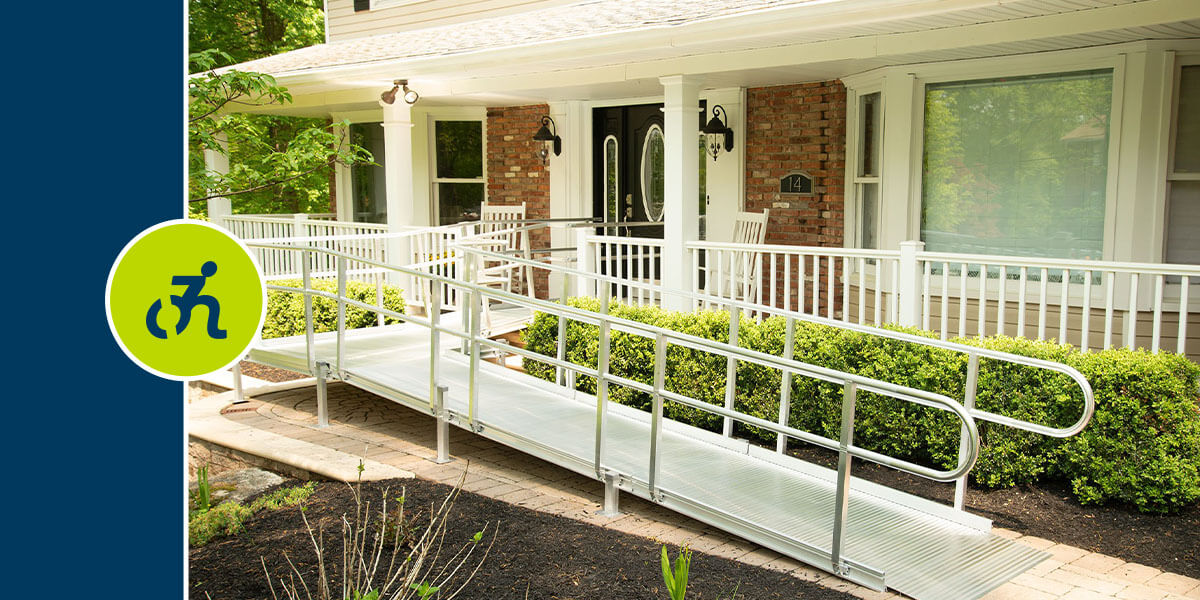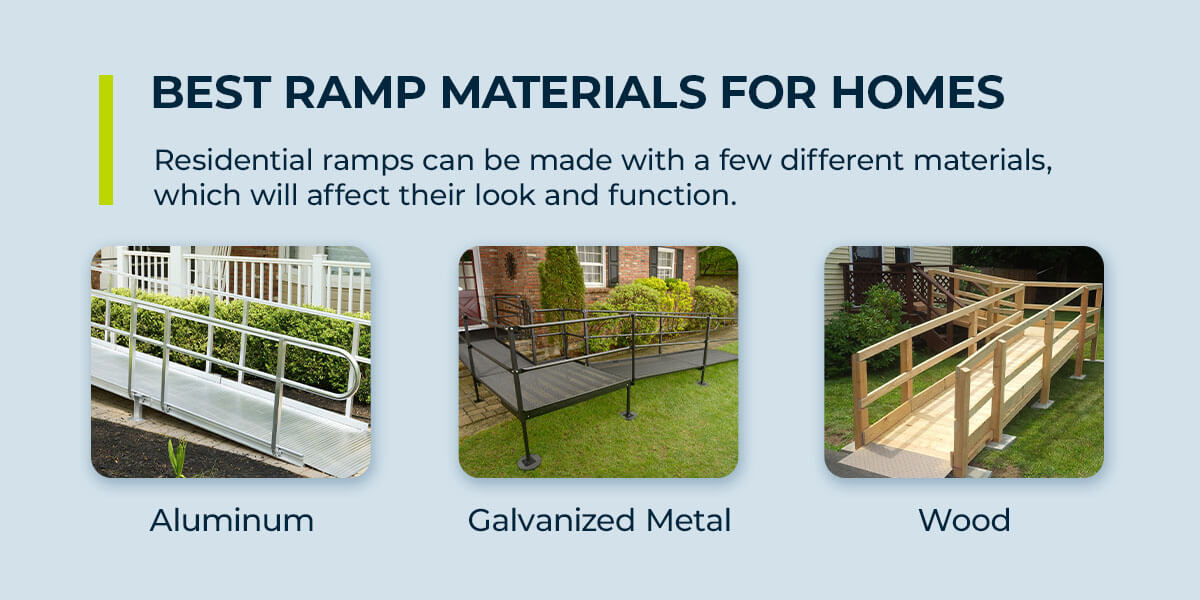
If you’re looking for a residential ramp for your home or that of a loved one, you might discover there’s more to the decision than you initially thought. Ramps are a wonderful addition that can make entering and exiting the home more accessible. They have a positive impact on people’s daily lives, enhancing their freedom and independence.
With these tips, you’ll feel confident in making an informed decision to purchase a ramp that’s perfect for your home.
Think About Your Home
If you’re looking at your home and wondering how you could fit a ramp where you need it, you’re not the first! Whether you have a few thresholds to traverse or a set of stairs, it’s important to take all these factors into account to find the type of residential ramp you need.
Some questions to ask when purchasing a ramp include:
- How much space is there? Since you’re working with an existing structure, it’s a good idea to measure the dimensions so you know the length, width and depth of the space you have to install the ramp.
- Are there any existing steps to contend with? To comply with residential codes, ramps must not exceed a certain grade — this may necessitate a longer ramp if there are steps that lead to the door. Landings could also be necessary for longer ramps to provide a space for users to take a break.
- What is the height of the doors the ramp will lead to? It’s important to ensure the doorways have enough clearance to accommodate individuals passing through from the ramp into the house.
If you’re not sure about your space, a dealer that provides professional installation services will have expert insights into how a ramp can fit on your property.
Codes and Requirements for Residential Ramps
When installing a ramp, you’ll need to be aware of the codes and regulations. A professional installer will have all the information to keep your ramp compliant with the necessary authorities, but it’s always good to understand the basic requirements.
The Americans with Disabilities Act (ADA) has specific guidance for residential ramps:
- Slope and incline: For existing residences, the running slope of a ramp cannot exceed 1:12 for every 1 inch of rise, though a slope of 1:8 is recommended for ease of use.
- Width: A residential ramp should be no less than 36 inches wide, including the width between any handrails.
- Railings: If a ramp run has a rise greater than 6 inches, handrails are mandatory.
- Landings: Each 30-foot ramp run should have landings at the top and bottom that measure at least 60 inches.
- Surface: Ramp surfaces must be stable, firm and slip-resistant.
For all the necessary requirements and considerations, refer to these ADA ramp guidelines from National Ramp.
Best Ramp Materials for Homes

Residential ramps can be made with a few different materials, which will affect their look and function. Let’s take a look at some of the best ramp materials:
Aluminum
Aluminum is a lightweight metal that’s durable and resistant to rust. You’ll find aluminum in many different building materials, including ramps. If you’re thinking about getting an aluminum residential ramp, consider these factors:
- Advantages: Aluminum ramps are strong and lightweight, making them an excellent ramp material. They also tend to be the most economical, as aluminum is more cost-effective than other materials.
- Disadvantages: Aluminum may dent more easily than wood or galvanized steel. The silver color may also clash with certain aesthetics.
Galvanized Metal
Treating metal with a protective zinc coating is called galvanization. Galvanized steel or iron is resistant to rust and tends to last longer than untreated metals. If you’re considering galvanized metal ramps, they come with the following considerations:
- Advantages: Galvanized metal ramps can withstand tough conditions and offer benefits like a long life span, minimal maintenance and upkeep, and resistance to corrosion.
- Disadvantages: While darker in color, galvanized metal ramps are, like their aluminum counterparts, difficult to adapt to different design aesthetics.
Wood
Wood is a natural resource that’s especially accessible as a building material. Choosing pressure-treated wood can extend its life span and make it resistant to pests, decay and water damage. If you think a wood ramp is the best choice, consider these factors:
- Advantages: A wood ramp will be more affordable and easier to install than other materials. Wood is also endlessly customizable — you can choose different paints and stains to match the exterior of your home for a less obtrusive look for your ramp.
- Disadvantages: Wooden ramps, like any other outdoor wood structure, will need some maintenance. Since wood is susceptible to warping from weather conditions, these ramps are not as durable as aluminum and steel.
5 Types of Residential Ramps to Consider
Getting a ramp can make a huge difference in accessing the home and enhancing independence. Consider these options when choosing what type of ramp you should get:
1. Threshold
Threshold ramps have a small incline to assist with traversing thresholds. They’re anunobtrusive addition if all you need is a short ramp to make it easier to enter the home, whether you have a mobility device or not. Threshold ramps are made of aluminum or extremely durable rubber.
2. Modular
Modular ramps are easy to install because they’re made of already fabricated and constructed parts. They’re perfect for both permanent and temporary ramp solutions and can accommodate multiple designs and spaces. Furthermore, repairs are easy with a modular ramp — rather than replacing the whole structure, you can remove and replace the affected portion, meaning you can access your home again more quickly.
3. Portable
If you need a ramp on the go or want the option of removing your ramp when needed, a portable ramp is an excellent option. Made of lightweight aluminum with hinges, these ramps are perfect for temporary disabilities or frequent visitors with assistive mobility needs. Portable ramps come with single-fold or tri-fold designs, or you can choose a suitcase design with a handle for easy carrying.
4. Bariatric
If you need a ramp with a higher weight rating or a wider structure, a bariatric ramp will be your best choice. These can accommodate wider wheelchairs and heavier mobility devices. Our bariatric ramps measure 48 inches wide, which can fit even the largest wheelchair models. They can support up to 1,200 pounds for three- and four-wheel scooters and powered or manual wheelchairs. Bariatric ramps can be used for vehicles, porches, curbs and steps.
5. In-Floor Ramp
An in-floor ramp slides in and out of the floor. Mostly used in vehicles for their unobtrusive design, in-floor ramps are useful for quick disembarkments. They can also be installed underneath the floor of a residence, and they come with controls that power the ramp, so there’s no need to move it manually.
Get Funding for a Residential Ramp
Many regional, state and national organizations provide assistance and grants for installing mobility aids like ramps. You can find financing options in your state or consult disability-specific organizations, such as the Multiple Sclerosis Society or The ALS Association, where you can apply for grants and funding.
Find the Best Ramp for Your Home With National Ramp
Live the life you want with a residential ramp addition for your home. Whether you’re looking for a permanent solution that matches your wood deck or need a small, affordable option for your side door, National Ramp has the expertise and experience to help with ramp installations at all kinds of residential properties. With more than 30 years in the industry, we can guide you in finding the best solution.
We work fast to ensure you have consistent and safe access to your home. Our local installers can work with you for professional installation services, and we can accommodate almost any design and budget.
Contact National Ramp at 877-596-7293, or reach out via our online form to learn more!

Don’t Risk Injury To You Or A Loved One
Why wait? Give us a call at 877-596-7293 or contact us online to get started!